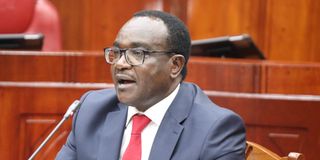Government bows to pressure, forms committees to review varsity funding model amid protest threats

Education CS nominee Julius Ogamba.
What you need to know:
- The decision came as a last-ditch effort to appease student leaders who had called for nationwide demonstrations.
- Student leaders, within minutes of the minister’s statement, announced suspension of their planned demonstrations.
The government has bowed to mounting pressure to review the new funding model for higher education and formed two working committees to look into the issues raised by students, parents and other stakeholders.
Education Cabinet Secretary Julius Migos on Sunday announced the formation of the committees, which he tasked with reviewing the implementation of the model and make recommendations for improvement.
His decision came as a last-ditch effort to appease student leaders who had called for nationwide demonstrations to protest against the new model that categorises learners in five bands, based on their ability to pay, family backgrounds, cost of courses, among other factors.
And Migos’s intervention paid off almost immediately as student leaders, within minutes of the minister’s statement, announced suspension of their planned demonstrations, but with conditions.
Led by Ramesh Saxena, Secretary-General, University of Nairobi Students’ Association (UNSA), the student leaders drawn from various universities issued a 30-day ultimatum to the government to address their concerns over the model, which they said was based on erroneous data, and placed a disproportionate burden on learners and their households.
With tensions running high, the student leaders revealed that they suspended their demos after receiving intelligence reports suggesting the infiltration of the protests by hired goons and security forces.
“We have checked on the purported infiltration of police (sic) in the planned protest for tomorrow. For the safety and security of our comrades, we believe demonstrations are not the best option at this point,” said Zadock Okoth, student leader, Kenyatta University.
In his statement, Mr Migos said the student leaders would be members of the “time-bound” committees, which would also include experts, and other relevant stakeholders.
While he student leaders acknowledged the government's efforts to involve them in decisions that concern them, they were quick to point out several gaps in the model, including lack of accurate data on household financial background.
Among the key issues the students want addressed are the high costs of accommodation and the rigid structure of university fee schedules.
Read: Cash and controversy: Student leaders reject Ruto's university funding model in State House talks
They urged the government to consider revising the funding model to make education more affordable, especially for students from low-income households.
Saxena expressed frustration with the current system, saying it unfairly burdens students, especially those from vulnerable backgrounds.
“We are giving the government 30 days to act, or we will be forced to resume our protests. Bands 4 and 5 should be scrapped entirely. They place unnecessary financial pressure on students who are already struggling to make ends meet,” said Saxena.
The student leaders said many of their colleagues had been inaccurately placed in bands that do not reflect their actual financial situations.
In addition to scrapping the controversial bands, the students are also demanding a reduction in the interest rates on student loans from four to two per cent per annum.
They argued that the current rates were too high, exacerbating the financial difficulties that many learners face, particularly in light of widespread unemployment.
"We do not want to see vulnerable students subjected to demands they cannot meet. Kenya is not a country of the affluent, we are a third world country and as such we cannot afford that. We need a system that supports those in need, not one that punishes them with unrealistic loan terms,” said Saxena.
Initially the students had accused the government of failing to engage with key stakeholders, including student leaders, in discussions about the funding model.
They criticised recent engagements by President William Ruto and Higher Education Principal Secretary Beatrice Inyangala as inadequate, saying they lacked meaningful input from the students and other critical stakeholders.
“We must also register that the dialogue has felt unilateral rather than bilateral. The government has been explaining the funding model to us without engaging in discussions or receiving proposals from those affected—particularly students and university representatives,” said Saxena.
“There were no proper consultations, and many students have been wrongly assessed, leading to incorrect loan allocations. First-year students, in particular, have been misclassified, and this needs to be addressed immediately.”
The student leaders called on the Education ministry swiftly review and adjust the new funding model to better meet the needs of all students.
“If the government does not take action, we will mobilise students across universities in Kenya to join the protests," said Adrian Oluoch, Chuka University student leader.
“We are ready to fight for our rights, and we will not stop until the government implements the necessary changes to support students.”
According to Clare Gathoka, a student at Kenyatta University, the government has been given an opportunity to rectify the “discriminative “funding model to avert challenges that would affect students from humble backgrounds.
“We have many cases where students are calling off the semester because they cannot afford or were placed in the wrong band numbers. They should make haste to avoid the challenges that students are facing,” Ms Gathoka said.






